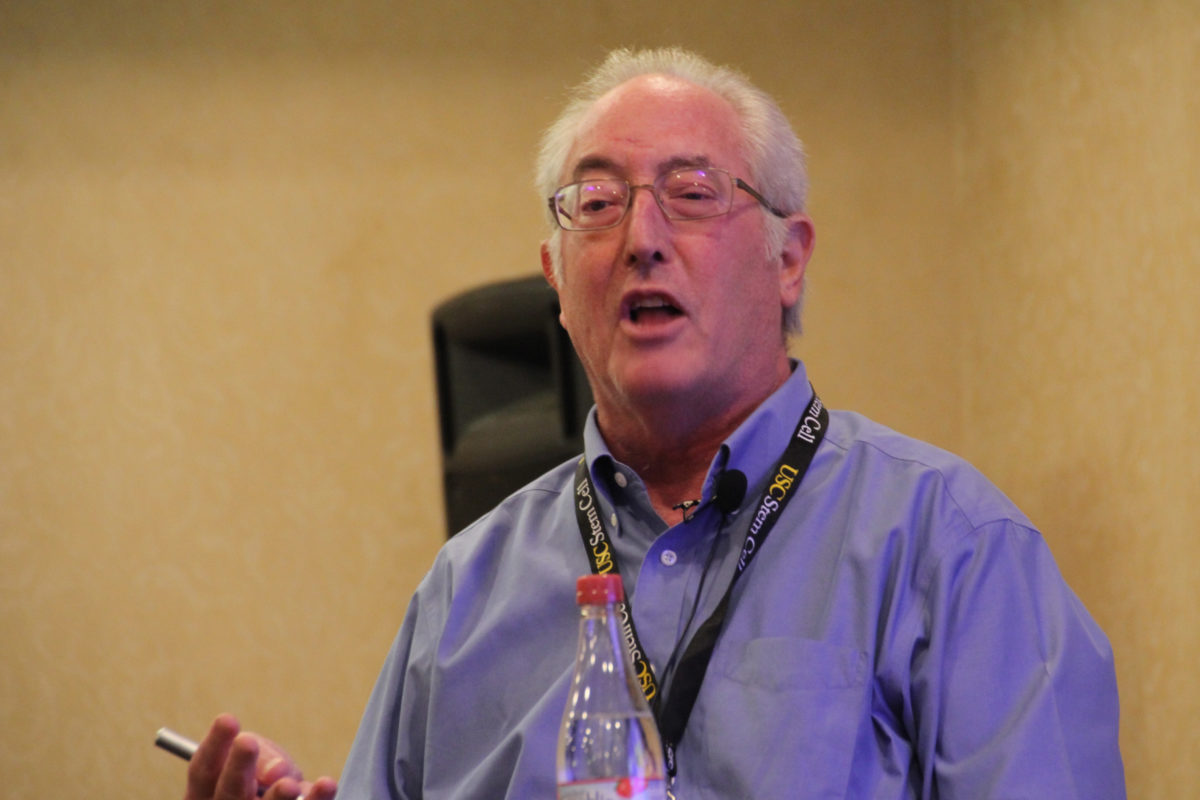
“The process of disease is about detail,” said Larry Goldstein, the director of the stem cell program at the University of California, San Diego, and keynote speaker at the retreat for USC’s Department of Stem Cell Biology and Regenerative Medicine. Held on October 20 and 21 at the Pala Mesa Resort in Fallbrook, California, the retreat illuminated the details of diseases affecting all parts of the body.
Goldstein shared his latest findings about Alzheimer’s disease, which affects 10 percent of people over age 65, and 50 percent of people over age 80. He described how his team is reprogramming human stem cells into neurons, and introducing key mutations implicated in Alzheimer’s disease. By studying these cells, they have discovered a possible link between cholesterol and Alzheimer’s disease.
Several USC graduate students and trainees presented other research related to the brain, nerves and senses. Yingxiao (TK) Shi from Justin Ichida’s lab described new insights into the causes of ALS, or Lou Gehrig’s disease. Max Bay from Michael Bonaguidi’s lab introduced a new computer-based approach to using genetic information to predict more effective treatments for neurological dysfunction. Xi Chen from Qi-Long Ying’s lab revealed that two similar forms of the same molecule produce opposite reactions in stem cells: self-renewal or differentiation into neural cells. And Vincent Yu from Neil Segil’s lab shared his research into the development and patterning of the inner ear.
The kidney was the subject of two presentations, including one by Zhongwei Li, the newest assistant professor of stem cell biology and regenerative medicine. Li is using stem cells to build mini-kidneys, called organoids, which can serve as a testing ground for potential drugs to treat kidney disease, or be developed into full-fledged kidneys for transplantation into patients. In a related talk, Tracy Tran discussed some of the lessons already learned from kidney organoids in the laboratory of Andy McMahon.
Several other talks focused on conditions affecting the muscles, skeleton, cartilage and teeth. Lindsey Barske from Gage Crump’s lab described the role of key genes in the development of the jaw, palette and middle ear. Stephanie Kuwahara from Francesca Mariani’s lab described a group of molecules that contribute to bone repair. Ben Van Handel from Denis Evseenko’s lab shared the discovery of a potential drug that might protect against osteoarthritis—as well as rheumatoid arthritis, lupus, neurodegeneration and baldness. Manmeet Raval from Joseph T. Rodgers’ lab discussed how metabolism affects the speed of muscle stem cell activation, which initiates the healing process. Junjun Jing from Yang Chai’s lab discussed the role of a group of molecules in activating stem cells and producing teeth.
Three scientists shared new research about cancer. Humberto Contreras-Trujillo from Rong Lu’s lab described how cancer cells respond to treatment of acute lymphoblastic leukemia. Remi Klotz from Min Yu’s lab revealed how the circulating tumor cells from certain breast cancer patients have a tendency to form brain metastases, due to specific gene mutations. Byoung san Moon from Wange Lu’s lab revealed a key group of molecules that drives the proliferation of neural stem and progenitor cells in a lethal type of brain tumor called neuroblastoma.
Two researchers focused on the number one cause of death in the U.S. and worldwide: heart disease. Peiheng Gan from Henry Sucov’s lab discussed how the ability to recover from a heart attack varies among individuals. Davi Lyra-Leite from Megan McCain’s lab detailed the connection between cellular energy generation and properties such as the elasticity of engineered heart tissue.
Jenny Magallanes talked about how Amy Firth’s lab is using stem cells to understand cystic fibrosis, a serious disease that interferes with breathing. Katelyn Millette from Senta Georgia’s lab shared what she’s learned by studying pancreas cells derived from a patient with a genetic form of diabetes.
Other talks described new tools and techniques for broadly advancing stem cell research. Kristina Tatiossian from Paula Cannon’s lab introduced a more efficient and accurate method for editing genes. She is applying this method to create a gene mutation that confers HIV resistance to blood-forming stem cells. Le Trinh from Scott E. Fraser’s lab highlighted a new imaging technique for studying what are known as “non-coding regions”—sections of the genome that either regulate the activity of other genes, or have unknown but important functions. And Alexander March from Leonardo Morsut’s lab talked about how to organize cells into specific spatial patterns and control their gene activity in order to create engineered tissues.
“In the end, our science has to be used to improve treating developmental diseases, injury and diseases that arise in the adult population,” said Department Chair Andy McMahon. “It’s really, really gratifying to see research moving in that direction.”
